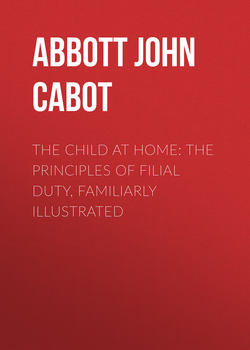The Child at Home: The Principles of Filial Duty, Familiarly Illustrated

Реклама. ООО «ЛитРес», ИНН: 7719571260.
Оглавление
Abbott John Stevens Cabot. The Child at Home: The Principles of Filial Duty, Familiarly Illustrated
CHAPTER I. RESPONSIBILITY
CHAPTER II. DECEPTION
CHAPTER III. OBEDIENCE
CHAPTER IV. OBEDIENCE, (continued)
CHAPTER V. RELIGIOUS TRUTH
CHAPTER VI. PIETY
CHAPTER VII. TRAITS OF CHARACTER
Отрывок из книги
Probably nearly all who read this book have heard the story of George Washington and his hatchet.
George, when a little boy, had received from his father a hatchet, and he, much pleased with his present, walked around the house trying its keen edge upon every thing which came within his reach. At last he came to a favorite pear-tree of his father's, and began, with great dexterity, to try his skill in felling trees. After hacking upon the bark until he had completely ruined the tree, he became tired, and went into the house. Before long, his father, passing by, beheld his beautiful tree entirely ruined; and, entering the house, he earnestly asked who had been guilty of the destruction. For a moment George trembled and hesitated. He was strongly tempted to deny that he knew any thing about it. But summoning all his courage, he replied, "Father, I cannot tell a lie. I cut it with my hatchet." His father clasped him to his arms, and said, "My dear boy, I would rather lose a thousand trees than have my son a liar."
.....
Will not the child who reads this account take warning from it? If you have done wrong, you had better confess it at once. Falsehood will but increase your sin, and aggravate your sorrow. Whenever you are tempted to say that which is untrue, look forward to the consequences. Think how much sorrow, and shame, and sin, you will bring upon yourself. Think of the reproaches of conscience; for you may depend upon it, that those reproaches are not easily borne.
And is it pleasant to have the reputation of a liar? When persons are detected in one falsehood, they cannot be believed when they speak the truth. No person can place any more confidence in them till a long time of penitence has elapsed, in which they have had an opportunity to manifest their amendment. The little boy, whose case we have above alluded to, was sincerely penitent for his sin. He resolved that he never would tell another lie. But since he had deceived his parents once, their confidence in him was necessarily for a time destroyed. They could judge of the reality of his penitence only by his future conduct. One day he was sent to a store to purchase some small articles for his mother. In his haste, he forgot to stop for the few cents of change which he ought to have received. Upon his return home, his mother inquired for the change. He had not thought a word about it before, and very frankly told her, that he had forgotten it entirely. How did his mother know that he was telling the truth? She had just detected him in one lie, and feared that he was now telling her another. "I hope, my dear son," she said, "you are not again deceiving me." The boy was perfectly honest this time, and his parents had never before distrusted his word. It almost broke his heart to be thus suspected, but he felt that it was just, and went to his chamber and wept bitterly. These are the necessary consequences of falsehood. A liar can never be believed. It matters not whether he tells truth or falsehood, no one can trust his word. If you are ever tempted to tell a lie, first ask yourself whether you are willing to have it said that nobody can trust your word. The liar is always known to be such. A person may possibly tell a lie which shall not be detected, but, almost always something happens which brings it to light. The boy who stopped to play when on an errand two miles from his father's house, thought that his falsehood would never be discovered. But he was detected, and overwhelmed with shame.
.....